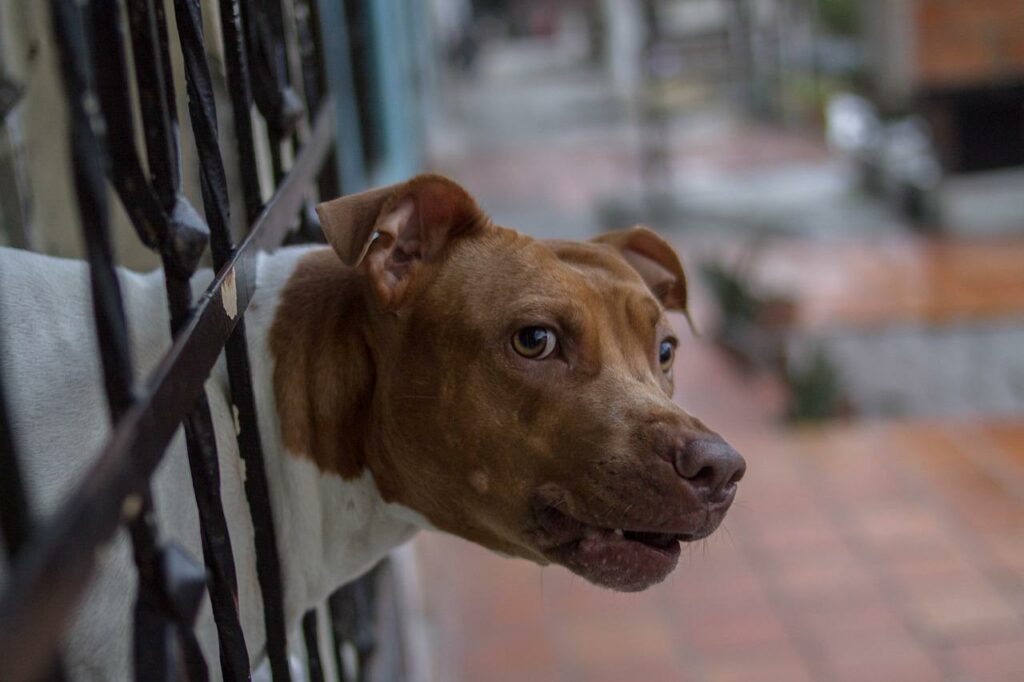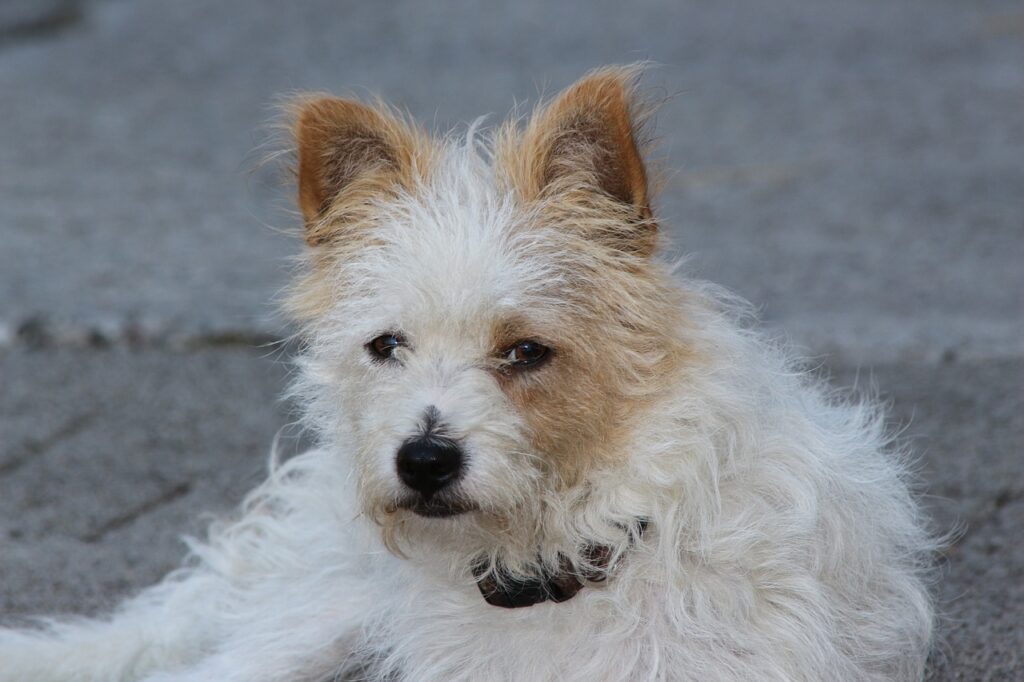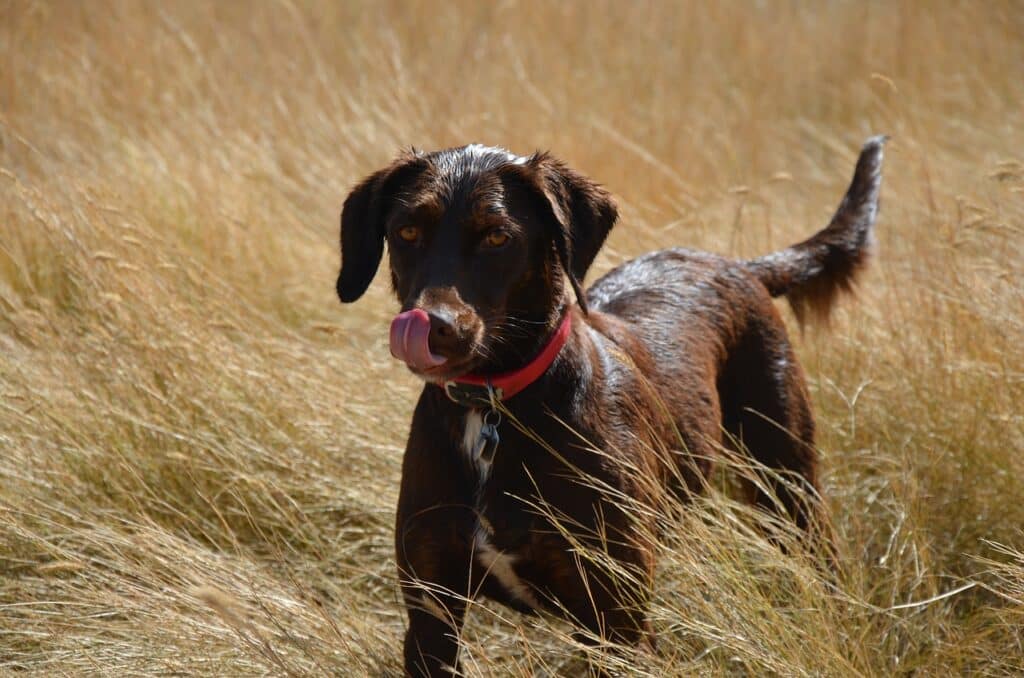If you have ever witnessed your dog growling, you may think they are threatening someone.
However, this is often not the case.
In fact, dogs may growl for a variety of different reasons.

Why Does My Dog Growl?
Dogs growl for many reasons.
Some of these include:
- They are trying to warn off an intruder from entering their territory.
- They are protecting themselves from another animal and/or human.
- They are expressing aggression towards another dog.
- They are in pain.
- They are afraid of something.
- They are defending their food bowl.
However, there are other things that cause them to growl, including:
- A fear of thunderstorms.
- The presence of smoke or fire.
- An unfamiliar smell.
- Being startled by loud noises.
- Anxiety.
- Pain.
- Something they have eaten or drank.
- Someone touching their ears.
- Someone else being too close to them when playing.
It is important to note that sometimes people misinterpret what their dog is growling about.
For example, if a person thinks that their dog is growling at them, they may become angry or fearful.
This will only make matters worse as the dog will feel even more threatened.
My Dog Growls At NothingWhat Could Be The Cause?
It’s very difficult to tell what causes your dog to growl.
They may do so because they are uncomfortable with something they don’t understand, like an unfamiliar person who walks past them in the street.
This is known as “freezing” and is a natural response from most dogs.
When your dog is freezing, they will typically stiffen their tail, hackles, and ears before turning around and staring at the unknown individual.
While this may seem intimidating, your dog is actually trying to get to know the other person and make sure they are safe.
Another reason your dog may growl is if they are frightened by a loud noise or smell.
For example, a dog may start barking when they hear fireworks, which could also be referred to as “freezing”.
However, there are many more reasons why your dog may growl.
Some common ones include:
- Puppies (under 3 months old) may growl while playing with toys or chewing on bones.
- Dogs that are bored and need exercise may growl while pacing around inside their kennel or yard.
- A dog may growl when they are startled by a sudden movement such as a car driving down the road.
- An aggressive dog may growl when they feel threatened by another dog.
If your dog does growl, it’s important to remember that this is normal behavior.
You shouldn’t worry about it unless it becomes excessive or frequent.
The best thing you can do is to keep an eye out for any signs that your dog might be growinglng and try to find ways to distract them.
Is My Dog Growling a Sign of Aggression?
Many people think that when their dog growls, they’re acting aggressively toward another person or animal.
This isn’t always the case though.
Here are some examples of why your dog could be growling:
- Your dog is trying to warn someone off from an area where they feel uncomfortable (such as a new home or a new friend).
- They are protecting themselves from being bitten by another animal.
- They are warning you about an impending danger such as a thunderstorm.
- They are showing affection towards you, especially if they are happy to see you.
How Do You Know When Your Dog Is Growling?
The main thing to look out for in order to determine whether your dog is growling is the context surrounding the growl.
For example, if you are walking through a local park and your dog growls then you know that they are probably growling at something that they don’t like.
On the other hand, if your dog growls while you are sitting on the sofa watching television then there is no reason to worry, because they are most likely just being affectionate.
You also need to consider what your dog is growling at.
If they are growling at a cat, then it might be a sign that they feel threatened by them.
However, if they are growling at a piece of clothing or a toy, then they are likely just expressing pleasure at seeing you.
It is important to remember that different breeds will react differently to certain situations.
For instance, if you own a German Shepherd, you should not expect them to behave the same way as a Labrador Retriever.

Should I Be Concerned If My Dog Growls?
It is important to understand what causes your dog to growl in order to help them manage their behavior and stop any problems from occurring.
A common misconception is that if you can’t see or hear your dog growling, then there is no problem.
This simply isn’t true.
Sometimes, growling is an aggressive display intended to intimidate another animal, but other times it is just a warning sign.
For example, if you have a playful dog who suddenly starts growling when playing with another dog, this could be a sign that they are getting too excited and need to calm down.
On the other hand, if your dog growls whenever they are left alone in the house, this could indicate that they are afraid of being home alone.
Either way, it would be wise to speak with a professional about your dog’s behavior.
If you do notice your dog growling often, there are several things that you should consider doing.
First, take note of the situations where they are growling most frequently.
Is it when they are around people, animals, or other pets?
Are they more likely to growl when they are left alone?
Once you have identified the situations that cause your dog to growl, you will have some idea of the reason behind it.
You can then work on correcting these behaviors by using one of the methods below.
While your dog growls, they are showing signs of aggression.
If you want to prevent future issues of aggression, it is important to correct the situation right away.
The longer you wait, the worse the behavior will become.
Fortunately, there are many ways that you can stop your dog from growling.
One of the easiest ways to stop your dog from growling is to get them used to new situations.
If you leave your dog with someone else every day, or bring them into different environments, you can get them accustomed to new situations without having to worry about them growling.
Another option is to take them to a veterinarian who specializes in working with dogs.
They can help you identify the root of the problem and provide solutions or techniques that will help your dog overcome their aggression.
Another thing that you can try is to give your dog a treat once they stop growling.
While this won’t completely fix the issue, it will reinforce that you are rewarding good behavior.
By rewarding your dog after they stop growling, they will associate the behavior with a positive outcome.
This will make it easier for them to repeat the action in the future.
When you talk to a professional about your dog’s growling, there is a chance that they will recommend medication.
While medication is effective in treating certain conditions, it is never recommended unless there is no other choice.
Medication should only be taken under the supervision of a veterinarian.
Even though it is possible to find prescription medications online, always check with your vet first before buying anything off of the Internet.
Once you know the reason behind your dog’s growling, you can start taking steps to correct the behavior.
Remember, while it may seem like your dog is growling at nothing, it could actually be a sign of aggression.
If you don’t correct the behavior quickly, it could lead to bigger problems than you originally thought.
The key to stopping your dog from growling is to catch it early.
When they start growingling, use the tips above to pinpoint the reason behind it.
Once you know the problem, you can correct it immediately.
How Can I Stop My Dog From Growling?
There are several things you can do to stop your dog from growling.
The first thing to do is make sure you and your dog are both comfortable with each other.
Dogs tend to growl when they feel uncomfortable, so if your dog isn’t used to being around people, they might start growling.
Make sure you and your dog are calm and relaxed before interacting with them.
In some cases, your dog may be growling in an attempt to communicate with you.
If you notice your dog growling when they’re trying to get your attention, you should try using positive reinforcement techniques such as petting, praising, or giving treats.
You should also avoid yelling or scolding them because this will only make matters worse.
If you suspect your dog’s growling is related to a medical issue, take them to your vet immediately.
A veterinary visit is essential because many conditions can cause a dog to growl.
- Dental issues – If your dog has bad teeth or gums, they may be growling due to discomfort.
- Ear infections – An ear infection can cause your dog to growl out of fear or pain.
- Heartworms – Heartworm disease can cause your dog to growl when they’re frightened or stressed.
- Kidney problems – Kidney disease can lead to dogs growling and barking.
- Liver disease – Liver disease can cause your dog to growl.
- Neurological disorders – Neurological disorders can cause your dog to growl.
- Parasites – Parasite infestation can cause your dog to growl.
- Skin allergies – Skin allergies can cause your dog to growl.
- Toothaches – Toothache can cause your dog to growl.
- Upper respiratory tract infections – Upper respiratory tract infections can cause your dog to growl.
- Vomiting/diarrhea – Vomiting and diarrhea can cause your dog to growl.
For more information about how to stop your dog from growling, check out these articles:

What If My Dog Growls At Me?
There could be a number of reasons why your dog is growling at nothing.
It could be that they’re picking up on something that you can’t hear or see, or it could be that they’re feeling anxious or threatened.
If your dog is growling regularly, it’s best to consult with a vet or behaviorist to help identify what is causing them to do so.
How Do I Know If My Dog Is Growling Because He’s Mad At Me?
A dog growling at you could mean they are feeling angry and are expressing their feelings through their body language.
They might also be showing you that they aren’t comfortable around you at all.
This can be due to anxiety or fear caused by unfamiliar people or situations.
For example, if your dog growled when you left them alone in a room, this could mean that they were fearful of being alone and wanted you near them.
Other times, it could be that they’re just mad at you and want you to leave them alone.
Regardless of what the reason is behind your dog’s growling, it is important to know how to calm down an upset or aggressive dog.
A good way to learn more about how to handle your dog’s aggression is to visit a professional trainer.
- What Dog Breeds Have Pink Skin? - March 24, 2023
- What Are the Most Inspiring Dog Breeding Quotes? - March 20, 2023
- Can Pheromone Spray Help Improve Dog Breeding Results? - March 19, 2023








